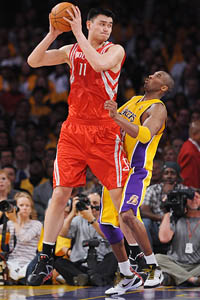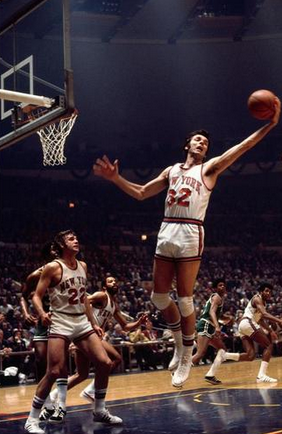Great players win early
I remain convinced that everything, everything (pretty much) you need to know about HR/Talent Management/The Workplace you can learn from watching the NBA. I even said as much a few weeks back.
The dynamics of NBA basketball exhibit remarkable similarities to many of the most common workplace situations: Relatively small working teams, (even in large organizations, most work gets done in much smaller groups), a need for the team to function cohesively, and, importantly, plenty of opportunity (and need for), individual expressions of creativity and high performance. Yao
Yao
With that setup, I want to call out yet another example of how understanding the NBA can help you with HR and Talent management, this time a look at how early-career NBA player performance can help you in evaluating tricky things like how long should it take a new hire to be 'fully productive' and an even more challenging question - 'What is the performance ceiling, or potential of this new hire?'
At Deadspin, they took a look at the early career results, (defined by team regular season win totals), for high draft choices (in HR-speak 'Top talent'), over the last 15 or so years. What they found after examining the data is for the most part is that really truly great players begin to show positive results for their (almost always 'bad') teams, by their third season in the NBA. Here is an excerpt from the analysis, then a couple of comments from me about how you might be able to consider this data in a 'normal' workplace context.
This is a look at regular season wins. Taking just the regular season gets us out of theringsssssss mentality. The NBA playoffs are the most meaningful of any sport's, but geting 66 wins out of Mo Williams, Boobie Gibson and Delonte West is a version of greatness that hasn't been explored as deeply as it probably should. (Steve here - this is a reference to the stiffs that LeBron James carried on his back in his first stint with the Cavaliers).
So let's draw a totally arbitrary line in the sand at 50 wins, and plot out not just who gets there, but when they get there, the idea being that in those first few years, we can isolate talented players on inferior teams. As it happens, the hunch mostly bears out: In today's NBA, good players win, great players win early.
The Deadspin piece goes on to list the players that meet this (admittedly subjective) criteria - 50 wins by year three, the player was a high draft pick, and the 'new hire' played significant minutes from the beginning of their career. And the list reads like a 'Who's Who?' of current NBA stars - Chris Paul, LeBron James, Kevin Durant etc. The point is not really that LeBron and Durant and Paul are great players, it is pretty easy to tell that by just watching them, but rather how that greatness actually manifests in organizational success, i.e., wins.
The point is (quoting from the piece), 'Good players win. Great players win early.'
What takeaways about new hire productivity and longer-term potential might you be able to glean from the data about NBA stars? I have three quick ideas:
1. The 'learning curve' for really talented, special performers is likely much, much shorter than for average performers. They will 'get' the basic elements of the industry/organization/role really quickly, and might be bored if your typical onboarding/training program feels too slow and too restrictive.
2. Great, transformative talent will likely demonstrate that talent in some manner pretty early in the process. It might be a great new idea for a product/service, an improvement in an existing process that saves time or money, or simply how they begin to elevate the performance of those around them. But the point is, you likely can tell pretty quickly if you have a potentially great performer on your hands.
3. But in order to one; not be bored with a slow training cycle, and two; even have the chance to demonstrate great ability and potential, the new player on the team has to be given some opportunity to do just that. In the NBA study, the new players had to have averaged 28 (out of 48) minutes of game action, i.e. they had to essentially be starting, featured players even though they were new. The same is true in any workplace really. In order to contribute meanigfully, you have to have a chance or platform to do just that. The overwhelming tendency is to shield new hires from the most complex and important projects until they are 'ready', but by doing that you might be preventing both their chance to demonstrate their true capability and potential.
It's all about the NBA. It is. I will convince you eventually. Ok, I am out.
Have a great day!

 Steve
Steve



